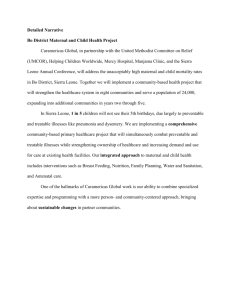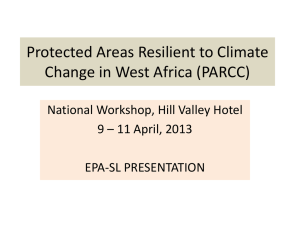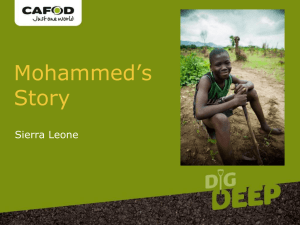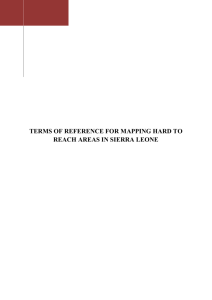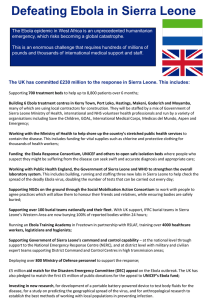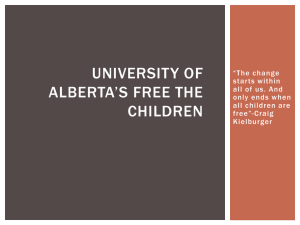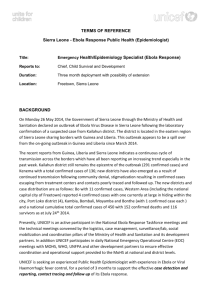Terms of Reference
advertisement
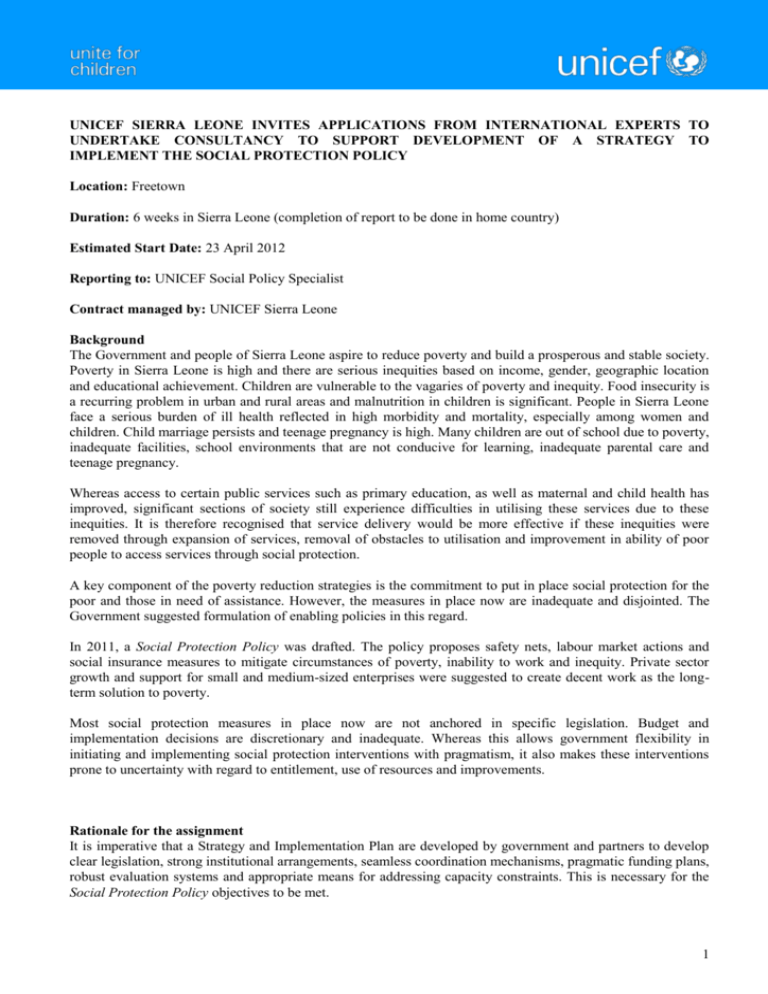
UNICEF SIERRA LEONE INVITES APPLICATIONS FROM INTERNATIONAL EXPERTS TO UNDERTAKE CONSULTANCY TO SUPPORT DEVELOPMENT OF A STRATEGY TO IMPLEMENT THE SOCIAL PROTECTION POLICY Location: Freetown Duration: 6 weeks in Sierra Leone (completion of report to be done in home country) Estimated Start Date: 23 April 2012 Reporting to: UNICEF Social Policy Specialist Contract managed by: UNICEF Sierra Leone Background The Government and people of Sierra Leone aspire to reduce poverty and build a prosperous and stable society. Poverty in Sierra Leone is high and there are serious inequities based on income, gender, geographic location and educational achievement. Children are vulnerable to the vagaries of poverty and inequity. Food insecurity is a recurring problem in urban and rural areas and malnutrition in children is significant. People in Sierra Leone face a serious burden of ill health reflected in high morbidity and mortality, especially among women and children. Child marriage persists and teenage pregnancy is high. Many children are out of school due to poverty, inadequate facilities, school environments that are not conducive for learning, inadequate parental care and teenage pregnancy. Whereas access to certain public services such as primary education, as well as maternal and child health has improved, significant sections of society still experience difficulties in utilising these services due to these inequities. It is therefore recognised that service delivery would be more effective if these inequities were removed through expansion of services, removal of obstacles to utilisation and improvement in ability of poor people to access services through social protection. A key component of the poverty reduction strategies is the commitment to put in place social protection for the poor and those in need of assistance. However, the measures in place now are inadequate and disjointed. The Government suggested formulation of enabling policies in this regard. In 2011, a Social Protection Policy was drafted. The policy proposes safety nets, labour market actions and social insurance measures to mitigate circumstances of poverty, inability to work and inequity. Private sector growth and support for small and medium-sized enterprises were suggested to create decent work as the longterm solution to poverty. Most social protection measures in place now are not anchored in specific legislation. Budget and implementation decisions are discretionary and inadequate. Whereas this allows government flexibility in initiating and implementing social protection interventions with pragmatism, it also makes these interventions prone to uncertainty with regard to entitlement, use of resources and improvements. Rationale for the assignment It is imperative that a Strategy and Implementation Plan are developed by government and partners to develop clear legislation, strong institutional arrangements, seamless coordination mechanisms, pragmatic funding plans, robust evaluation systems and appropriate means for addressing capacity constraints. This is necessary for the Social Protection Policy objectives to be met. 1 Purpose of assignment The purpose of this consultancy is to provide the international experience, the strategic expertise and the independence of thought to facilitate a seamless process of bringing together Government, development partners and civil society to discuss and establish a Strategy and Implementation Plan for the Social Protection Policy. Key tasks Under the supervision of the UNICEF Social Policy Specialist, the consultant shall manage a consultative, analytical and advisory process intended to enable Ministries, agencies, Parliament, Local Councils, international organisations and civil society to discuss and establish a Strategy and Implementation Plan to effect the Social Protection Policy. The consultant will: (a) Analyse existing social protection interventions in Sierra Leone and outline areas for stakeholders to discuss for improvement; (b) Generate objective guidance on social protection based on relevant international lessons relevant for the context and traditions of Sierra Leone and lead stakeholders in discussing how to establish and improve interventions; (c) Facilitate interactive consultations between stakeholders to discuss and agree on legislative actions, institutional arrangements, coordination mechanisms, funding plans, evaluation systems and capacity development efforts necessary to effectively and efficiently implement the Social Protection Policy. Methodology Initially, the consultant shall prepare an inception report to show how s/he will carry out the terms of reference of the work in a timely fashion. The consultant will then analyse the gap between the aspirations in the Social Protection Policy and existing interventions using the recent assessment study that was conducted by the Government with the support of the World Bank and UNICEF and prepare a report outlining these gaps. This gap analysis should consider the poverty and inequities that people, including children, face in Sierra Leone. The report will briefly outline what areas of existing interventions need improvement and what new measures are necessary for the policy objectives to be met. Using the analysis thus conducted, and bringing international best practice and the socio-economic, political and traditional realities in Sierra Leone to bear, the consultant shall facilitate highly interactive consultations between stakeholders to ensure that insights from all relevant government entities, international organisations and civil society are gathered and incorporated into an outline of the Strategy and Implementation Plan to be used to develop specific social protection interventions. Particular attention shall be paid to value-for-money considerations, choice of universal and targeted delivery mechanisms, fiscal viability and evaluation systems. The state of human resources, administrative systems and institutional capacity, as well as constraints, will be taken into account in designing the Strategy and Implementation Plan. Having exhaustively consulted stakeholders and ensured that consensus is developed on specific social protection interventions, the consultant shall guide the stakeholders in developing the final Strategy and Implementation Plan documents discussing all social protection interventions and the legislative actions, institutional arrangements, responsibilities, coordination mechanisms, funding plans, evaluation systems and capacity development efforts necessary to effectively implement these interventions. Deliverables 1. Inception report showing the methods the consultant will use and the timelines for successfully meeting the terms of reference of the consultancy (due 1 week after commencement); 2. A report discussing the gap between the objectives of the Social Protection Policy and existing interventions using the recent assessment by the Government, World Bank and UNICEF (due the end of the 2nd week of the assignment); 2 3. Outline Strategy and Implementation Plan based on the gap analysis and initial consultations with stakeholders (due end of 4th week of assignment); 4. Final Strategy and Implementation Plan documents outlining all social protection interventions and legislative actions, institutional arrangements, responsibilities, coordination mechanisms, funding plans, evaluation systems and capacity development measures (draft for comments due 2 weeks after end of country mission; final draft after comments due 4 weeks after end of country mission). Minimum qualifications of the consultant The consultant should have a minimum of: (a) An advanced academic degree from a recognised university in economics, development studies, public finance, law or social sciences. Candidates who combine academic qualification and experience in more than one of these disciplines will have an added advantage; (b) More than ten years of leadership and professional experience in social protection policy analysis and formulation; and design and implementation of public policies, especially those related to social sectors and poverty reduction. Candidates who have successfully held senior leadership positions in government or development organisations will have an added advantage; (c) Deep understanding of best practices in social protection policies, interventions and impacts in different economic, social, cultural and political settings, including sub-Sahara Africa, evidenced by either publication on this subject matter or work on different social protection measures in various countries; (d) Excellent facilitation skills proven by leading strategic planning exercises for large organisations that involve multiple stakeholders across a range of sectors; (e) Proficient in the use of data and word processing computer software; (f) Superb command of the English language. Responsibilities of UNICEF (a) Payment of fees for the work as well as allowances and travel expenses agreed. Payment of fees shall be strictly based on satisfactory delivery of the products specified under ‘deliverables’; (b) Provision to the consultant with information technology facilities, documents and support necessary to carry on the work. Responsibilities of the consultant (a) Diligent work to deliver satisfactory outputs specified in the ‘deliverables’ in a timely fashion; (b) Adherence to all rules and procedures customarily required by UNICEF in the conduct of such work including maintaining confidentiality, recognizing that all products of the work are intellectual property of UNICEF and its partners and keeping working hours for the duration of the consultancy. Interested persons should send an application letter, curriculum vitae and a completed P.11 to the Human Resource Officer, UNICEF Sierra Leone, using the following email on or before Friday 23 March 2012. Email: espilsburywilliams@unicef.org 3
